Contrary to popular belief, not all women immediately realize they’re carrying a child. There are multiple instances of this, especially when the only basis is the woman’s excess body fat, especially around the stomach. It helps to know the differences between fat and pregnant bellies.
There are a lot of differences between a pregnant belly versus a fat belly. Pregnant bellies are firm, but also flexible. Fat bellies are soft and squishy.
The swollen area is also different – most of it will be on your lower abdomen if you’re pregnant, while upper abdomen bloating is one of the more noticeable signs that you have a fat belly. Simply put, pregnancy has your tummy swell up like a balloon, while normal fat just tacks on extra layers.
It’s worth noting that medical professionals advise against women deducing whether they’re pregnant or not only by looking at the external changes in their bodies. Although a growing belly is a sign of pregnancy, there are other possible causes for this condition.
Pregnant Belly vs Fat Belly Differences
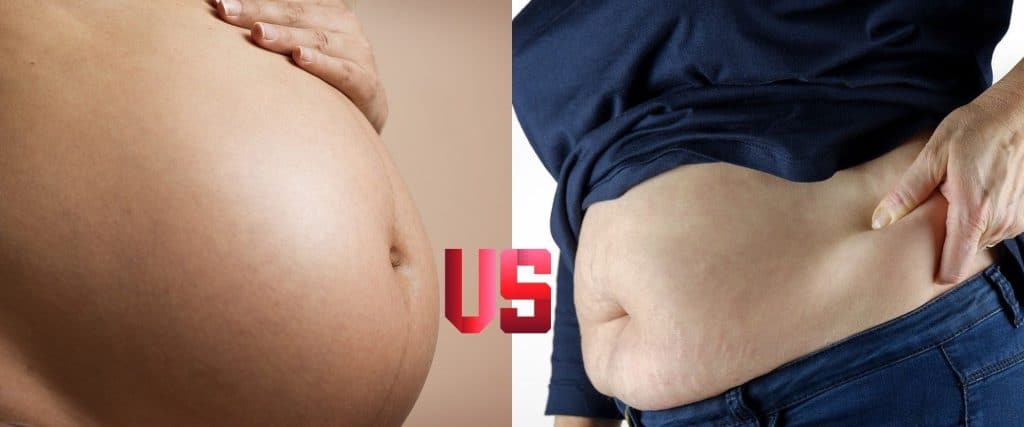
1. Pregnant Belly is Firm While Fat Belly is Soft
One of the key differences between a pregnant belly versus a fat belly is firmness. A developing baby takes up a lot of space, and they’ll not only stretch your abdominal muscles but even start to press against some of your organs! This turns your belly firm and round and is noticeable as early as the first trimester.
Fat bellies are squishy and softer than pregnancy bellies. The belly fat you can pinch is your subcutaneous fat, which refers to the fat under the skin. The amount of subcutaneous fat in your body depends on your genetics, nutrition, and physical activities.
It’s significant to emphasize that even if you’re not pregnant, your belly can feel firm. Your visceral fat, which pertains to the fat surrounding your organs, is responsible for this. Visceral fat contributes to several diseases and health conditions, making it harmful.
2. Pregnant Belly Grows in the Lower Abdomen While Fat Belly Develops in the Upper Abdomen
When the fourth- or fifth-month approaches, the uterus will slightly press your abdominal wall outward. You’ll notice a bulge in your tummy by then. On the other hand, a fat belly results from the accumulation of fat deposits in the upper area of the abdomen.
It’s challenging to predict which between your upper and lower stomach will expand first when you’re pregnant because it differs for each individual. Height, weight, and body type affect this. It’s also different for first-time mothers and women who experienced pregnancy before.
There are many factors contributing to the appearance of the baby bump. First-time mothers can usually see a visible bulge between 12 and 16 weeks. Women who’ve been pregnant before will notice it sooner because their abdominal walls already went through the stretching process.
Naturally, the number of fetuses also matters. The belly bump will be more significant if you’re an expecting mother of twins or more. Overweight women might also notice the baby bump later than people with lower body weights.
3. Pregnant Belly Looks Like an Inflated Balloon While Fat Belly Has Layers

Another of the many differences between a pregnant belly and a fat belly comes from their appearance. A pregnant belly resembles a round, inflated balloon.
This is because only their abdomen expands, and mostly at the lower area – closer to the uterus. On the other hand, fat bellies are composed of soft, almost-padded layers. This fat tends to accumulate on the upper layer of their abdomens.
For overweight or obese women, they may also notice some of their other body parts – often their arms and thighs – start growing a little softer to the touch. Being able to tell the difference between a pregnant belly versus a fat belly is important, but don’t forget that these situations aren’t always mutually-exclusive!
4. Pregnant Belly is Heavier than Fat Belly
Essentially, a pregnant belly is heavier than a fat belly because the former implies that a baby is growing inside you. You’ll feel heavy, and your lower back will hurt around the 20th week of your pregnancy.
Your heavy belly will make walking, sitting, and even lying down challenging. You might also have trouble sleeping. Expect to notice more stretch marks and your uterus aligning to your belly button.
Different Types of Fat Bellies
1. Inflated or Bloated Belly
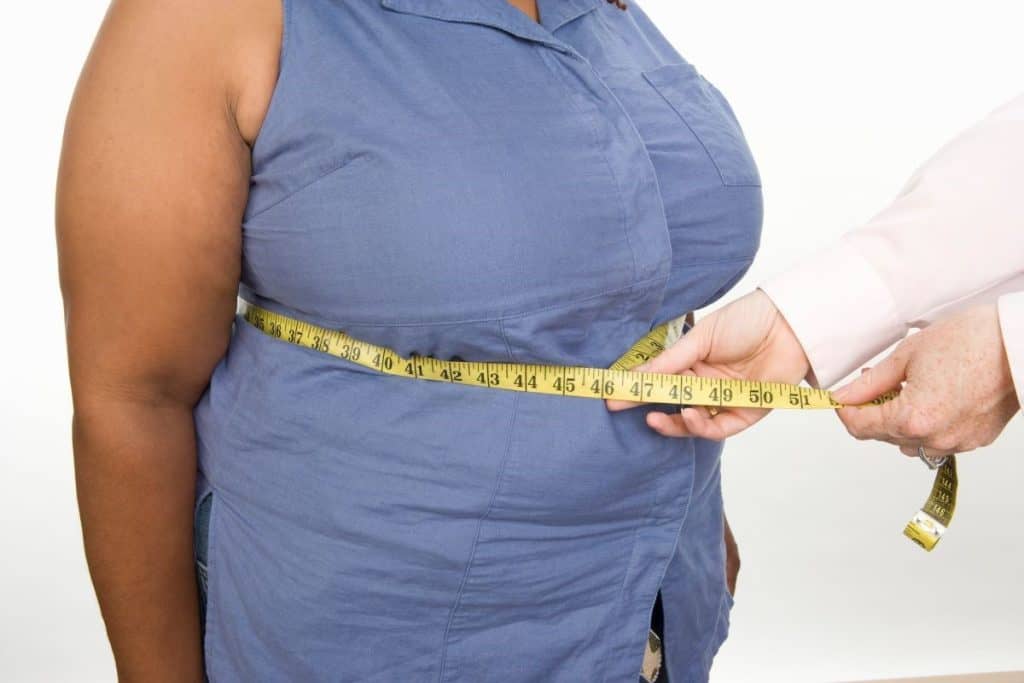
Bloating in the stomach is typically a byproduct of too much intestinal gas or a buildup of fluids. It’s usually temporary and happens after eating. Particular foods increase the chance of bloating (e.g., dairy products, fruits high in fructose, wheat, carbonated drinks, etc.).
In some instances, a bloated belly is a symptom of irritable bowel syndrome (IBS) or small intestinal bowel overgrowth. Aside from bloating, you’ll experience abdominal pain, diarrhea, and constipation if you have either health condition.
2. Hormonal Belly
Your hormones are responsible for regulating multiple bodily functions. If there’s an abnormality or imbalance in your hormones, it might cause a hormonal belly. Women with polycystic ovary syndrome (PCOS) usually gain significant weight around the abdomen.
Similarly, women entering the menopause stage will experience a drop in their estrogen level, increasing abdominal fat. It’s worth noting that unhealthy food, stress, and a lack of proper rest also affect your hormones and can therefore lead to a hormonal belly.
3. Stressed-Out Belly
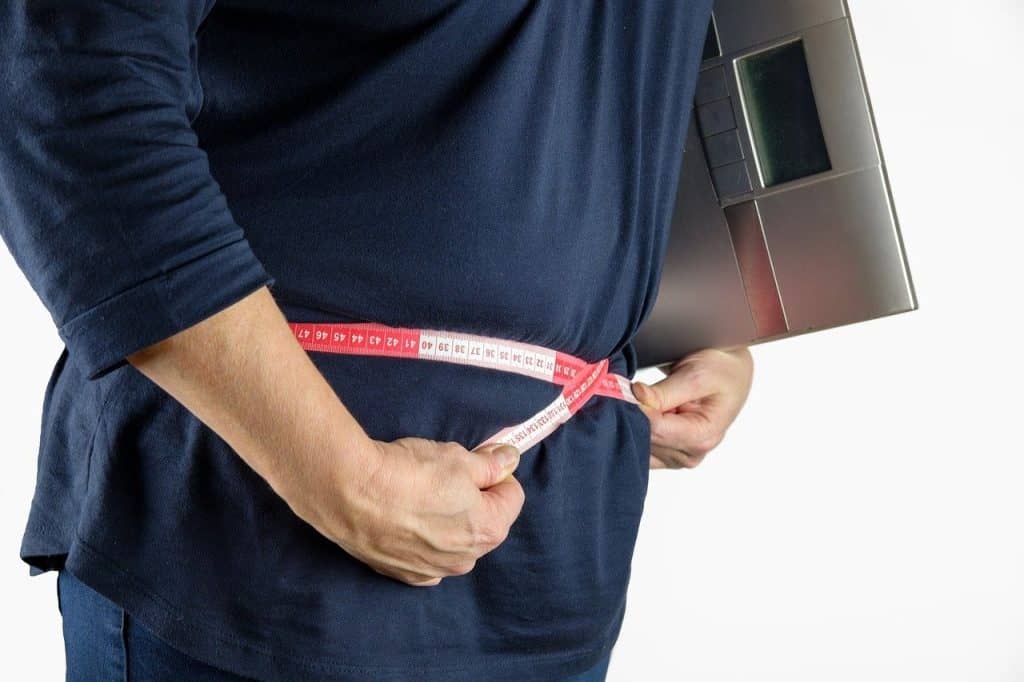
Chronic or prolonged stress can cause an accumulation of excess abdominal fat, leading to a stressed-out belly. Cortisol, the hormone regulating your stress response, links to abdominal obesity.
Your blood sugar level will increase due to prolonged stress, increasing your cortisol level. This process is what causes your abdomen to amass excess fat. If you have a stressed-out belly, you’ll notice that you’re always hungry and overwhelmed.
4. Alcohol or Beer Belly
When you consume too much alcohol, you’re more prone to having a beer belly (also called spare tire or middle-age spread), which pertains to a large, protruding belly. As opposed to its name, the culprit isn’t beer itself but the calories.
5. Mom’s Belly or Postpartum Belly
After giving birth, some women will notice a bulge below their belly button. This case is typical among mothers. After all, the stretched-out abdominal muscles during pregnancy will naturally loosen after childbirth.
One of the biggest differences between a pregnant belly and a fat belly can be seen here: after the baby is born, they no longer put pressure on the mother’s abdominal muscles. Their tummy starts to lose its old firmness and actually begins to resemble a normal fatty belly.
You can check this with a pinch test: give your belly skin a small squeeze. If you’ve got more than a few millimeters of space between your fingers, chances are you’ve got some belly fat to burn through! That said, pregnancy always packs your body with lots of fat, so wait a few months first before considering your results.
Possible Causes of Belly Fat
1. Diet

The primary contributor to gaining belly fat is your diet. Consuming food high in added sugar (e.g., processed foods, sugar-sweetened beverages, desserts, etc.) will increase your belly fat. Excessive alcohol consumption is also a typical cause of belly fat gain.
It helps to be cautious of eating food that consists of trans fats. Prepackaged goods and baked products have high levels of trans fats. It’s worth noting that this is one of the unhealthiest fats that contributes to visceral fat, which leads to poor health conditions.
2. Age
As you grow older, it’s inevitable to decrease your physical activity. Your metabolism will also slow as you age. Given these two facts, it’s natural for you to burn fewer calories and gain weight.
Most women gain belly fat when they reach their menopausal period. Your estrogen levels drop significantly during this time. Estrogen is the hormone that helps you store your fat in different parts of your body, specifically your hips, thighs, and buttocks, to support you during pregnancy.
When estrogen levels decline, your belly will amass fat instead. You can prevent the risk of gaining abdominal fat due to hormone drops through estrogen therapy. You must consult a healthcare professional if you wish to use this intervention.
3. Medications

Certain medications, such as antidepressants and birth control pills, affect your appetite. If your hunger controls your food consumption, it’s inevitable to gain belly fat.
Some medications also impact where your body stores fat. For instance, people prescribed corticosteroids might notice that their body stores fat in the stomach, increasing their size.
Lastly, some medications leave you exhausted and unmotivated, making it challenging to exercise and burn calories. This scenario often results in weight gain and belly fat.
4. Sedentary Lifestyle
Living your life with little to no physical activity exposes you to the risk of various damaging health conditions, such as obesity, type 2 diabetes, cancer, cardiovascular diseases, etc. Being inactive for an extended period will affect your metabolism and weaken your immune system.
5. Genetics
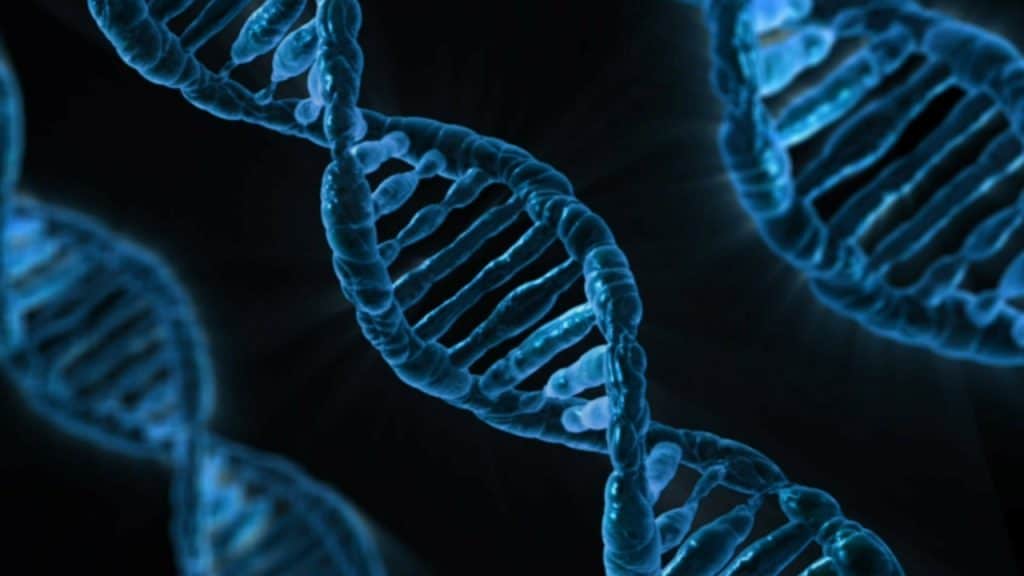
Aside from age, genetics affects metabolism. There are many different genes and gene variants that affect not only your metabolism but also your response to fat and carbohydrates. One of the genes worth highlighting is the FTO gene, which increases the risk of obesity.
6. Chronic Stress
Unknown to many, chronic stress significantly impacts your physical, emotional, and mental health. When cortisol (the primary stress hormone) is in excess, it circulates in the body for an extended time. This occurrence leads to developing cortisol belly fat.
Cortisol also increases your appetite, encouraging you to consume more food. When stressed, you might find it hard to make rational food choices. You’ll likely crave more for baked goods and processed food.
Your cortisol levels also directly impact several of your hormones, including testosterone, estrogen, and thyroid hormones. These affect your metabolism and disables you from burning the number of calories you must burn daily to stay healthy.
How to Lose Belly Fat
Because of various risks associated with belly fat, losing it is vital to living a healthier life. Below are some ways to get rid of the excess fat in your stomach.
If You Have a Bloated Belly
1. Identify the Cause
There are other causes of bloating belly aside from gas, such as food intolerance, ingesting excess air, constipation, or imbalances in the bacteria in your gut. According to research, stress, anxiety, changes in your menstrual cycle, a high-fat diet, and weight gain contribute to bloating.
2. Avoid Food that Triggers Bloating

Certain foods contain compounds that are hard to digest (e.g., fruits like peaches, vegetables like broccoli, etc.), and eating them typically lead to bloating. The undigested compounds gather in the large intestine. Once the bacteria ferment them, gas in the body will increase.
3. Limit Eating Dairy Products
If you’re lactose intolerant, the standard advice is to avoid consuming dairy products. However, it’s worth noting that dairy products contain primary sources of essential nutrients, such as calcium, zinc, and protein. Therefore, it’s best to consult your doctor before changing your diet.
4. Consume Probiotic Supplements
Not all bacteria are harmful to your health. Probiotics, for instance, are live microorganisms that aid your body digest food and ease digestive issues like bloating. You can try probiotic supplements or eat food rich in them like yogurt, kimchi, miso, and kombucha.
5. Avoid Eating Large Meals and Fatty Foods

Eating large portions of food will stretch your stomach, eventually leading to bloating. In addition, if you eat food containing non-digestible carbs, your body will produce and retain more gases. Limiting your food consumption and avoiding salty and fatty foods is best.
6. Take Peppermint Supplements
Albeit limited, there’s research on peppermint oil capsules as a digestive aid. According to one study, peppermint in supplement form helps relieve symptoms of bloating and distension. However, it’s worth noting that this topic requires more research.
7. Try Not to Swallow Too Much Air
People with aerophagia tend to swallow too much air and are more prone to bloating, belching, and distension. Suppose you tend to gulp excessive amounts of air. In that case, don’t eat rapidly, avoid chewing gums, and limit your consumption of carbonated drinks.
8. Make Exercising a Habit

Light exercise reduces bloating symptoms. Cycling or going on 10 to 15-minute walks after meals will eliminate feelings of fullness or bloating. Exercising regularly also aids in avoiding rapid weight gain, which contributes to bloating by restricting bowel movement.
If You Have a Hormonal Belly
One way to get rid of a hormonal belly is through hormone therapy. However, like many treatments, hormone therapy also comes with health risks. Therefore, it’s advisable to consult a doctor first.
Other natural ways to lose hormonal belly fat include limiting sugar intake and regular physical activity. Healthy foods like fruits, legumes, lean protein, whole grains, low-fat dairy, and cruciferous vegetables like cauliflower and broccoli also help.
If You Have a Stressed-Out Belly

1. Reduce Stress
Naturally, the best way to get rid of a stressed-out belly is by limiting your stress and ensuring that you balance your cortisol levels. You can reduce stress by doing breathing exercises, listening to calming or uplifting music, and basking under the sun. Do what works for you.
2. Eat a Balanced Diet
Your body needs energy and the necessary nutrients to manage or battle stress. Eating a balanced diet based on the food pyramid will help you reduce stress. Eat foods rich in magnesium, antioxidants, vitamin B2, vitamin E, and zinc (e.g., nuts, fish, whole grains, pumpkin, etc.).
3. Exercise Moderately
Exercise, when done moderately, is beneficial for you. However, intense exercise only contributes to increased cortisol levels. It’s advisable to do mood-boosting exercises instead of intense workouts.
4. Improve Your Sleeping Habits
Aside from gaining belly fat, chronic stress affects your sleeping pattern. Consequently, you’ll develop more visceral fat if you get less than the required amount of sleeping hours in a day. In other words, you must improve your sleeping habits to avoid this vicious cycle.
If You Have a Beer Belly
The primary cause of a beer belly is alcohol. Therefore, if you want to lose it, drink alcohol moderately, and consume water before, during, and after drinking alcohol. Many people drink to relieve stress, but excessive drinking will cause weight gain, which can cause even more stress.
If You Have a Mom’s Belly or Postpartum Belly

It’s natural for a woman’s body to change drastically and gain belly fat after giving birth. Many think they need to do crunches immediately to work on their abdominal muscles. However, doing this will further stretch the connective tissue between your abdominal muscles.
Starting with pelvic tilts is more advisable. You can do core-strengthening exercises two to three times a week. You can also do the forearm plank, reverse crunch, and scissor kicks.
Other Ways to Get Rid of Belly Fat
Track Your Sitting Habits

Unknown to many, spending long hours sitting causes harm and poses health risks. Remember to take frequent breaks if your daily tasks force you to sit for extended periods. Walk, take a stroll, stretch your limbs, or grab a healthy drink.
Taking small breaks will help you lose belly fat, freshen your mind, and increase productivity. You might also consider using the stairwell instead of riding the elevator. According to experts, using the stairs burns more calories than running.
You can try studying, working, or doing tasks that require sitting while standing (if your circumstances allow you). Doing so will lessen your sitting hours and bring you various benefits. A standing desk is excellent for this job.
Track Your Food Consumption
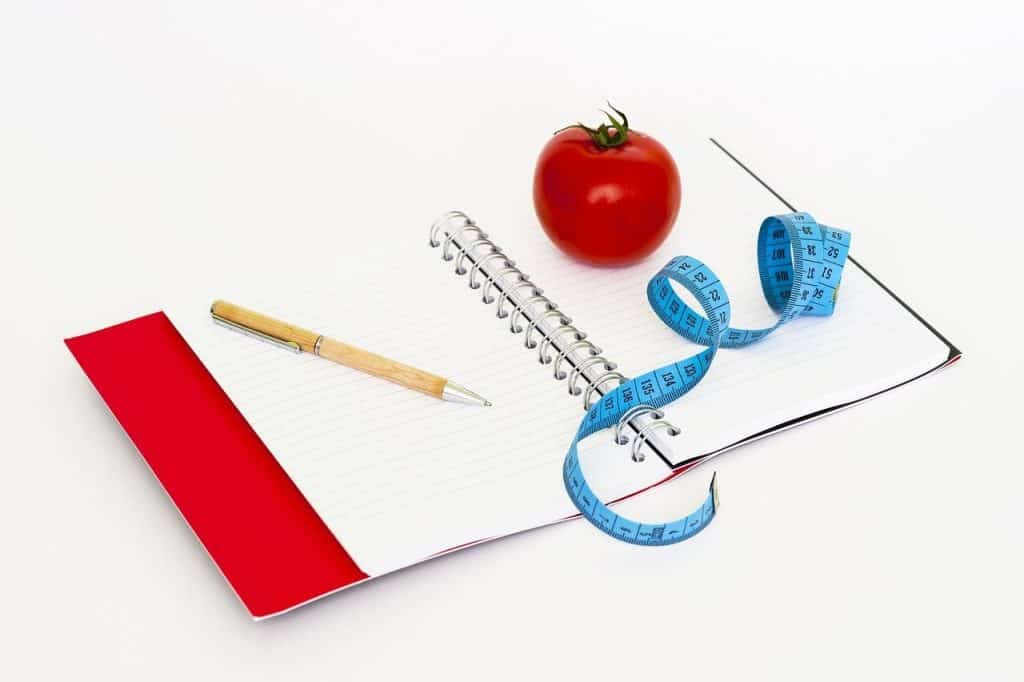
Tracking your food intake will help you avoid underestimating or overestimating your consumption. Doing this doesn’t mean obsessively weighing or measuring all the food you eat. Instead, tracking your food consumption will help you plan effectively and reach your goals.
Firstly, if you wish to lose belly fat, the first thing you must do is avoid eating food with added sugar. Added sugar brings a negative impact on your metabolic health. It contributes to the buildup of fat around your liver and abdomen.
It’s also advisable to avoid sugar-sweetened beverages (e.g., soda, fruit juice, sports drink, etc.) because these have more calories. Beware of food and drinks marketed as healthy because some still contain loads of sugar. Reading the labels will help you avoid this scenario.
Secondly, eat fewer carbohydrates and more protein. Protein helps with weight loss because it reduces cravings and boosts metabolism. Research also shows that people who eat more protein have less abdominal fat.
It’s worth mentioning that carbohydrates increase your appetite. Try sticking to a low-carbohydrate diet. You might also want to eat fiber-rich foods (e.g., legumes, fruits, vegetables, etc.) because eating plenty of it aids with weight loss.
Other Symptoms of Pregnancy You Should Know
Not everyone has the same body structure and experiences. Therefore, one shouldn’t rely on external physical appearances when determining if they’re pregnant or not. Below are some signs that might indicate pregnancy.
1. Missed Menstrual Period

One of the most telling signs of pregnancy is a missing period. If you’re pregnant, your levels of estrogen and progesterone will rise. In addition, your uterus lining will thicken to nurture your fertilized egg.
Although a missed menstrual period is a telltale sign of pregnancy, it’s significant to note that it can be due to other causes. One of the most common causes is hormonal birth control. Some women who take birth control miss their period because it makes their uterus lining so thin.
Stress is also a contributing factor. People react to stress differently. Women who experience chronic stress suffer from cortisol imbalance, affecting their menstrual cycles.
Weight fluctuations and specific medications also contribute to hormonal imbalances that can cause missed or late menstrual periods. Other possible causes include excessive exercise, diet changes, polycystic ovary syndrome (PCOS), menopause, and thyroid disease.
2. Changes in Bathroom Habits
Your hormones are vital in regulating different body functions, especially during pregnancy. As your hormone levels increase, you’ll most likely experience constipation. You’ll also feel the need to urinate frequently.
These changes usually occur during the second trimester. Aside from the hormone progesterone, your lifestyle, including your diet, fluid intake, and exercise, also affects your bathroom habits. Lastly, as the fetus grows, your uterus will feel heavier, putting pressure on your bowel.
3. Morning Sickness

Morning sickness is perhaps the most portrayed symptom of pregnancy in popular media. Some women will experience vomiting and nausea around the sixth week of pregnancy towards the second month.
There’s a common misconception that women only experience morning sickness during the day because of its name. Still, it can happen at any time of the day—moreover, not all mothers experience morning sickness.
4. Spotting
Light vaginal bleeding, or spotting, can be terrifying, especially for first-time mothers. The color of the blood varies from pink and red to dark brown. In most cases, the baby is healthy, and there’s no cause for alarm.
Spotting during the first trimester can be due to implantation bleeding and occurs several days after conception. If implantation bleeding isn’t the cause, you might need to go to the doctor immediately because you might be experiencing an ectopic pregnancy.
An ectopic pregnancy occurs when the fertilized egg affixes itself to the lining outside the uterus. It’s dangerous and can even be life-threatening. You might experience abdominal pain, dizziness, rectal pressure, or fainting with light to heavy bleeding.
Light vaginal bleeding in the first trimester can also result from early pregnancy loss. Contact your doctor immediately if you experience back pain, contractions, weight loss, and a decline in pregnancy hormone levels.
Meanwhile, spotting during the second trimester might result from either irritation or growth in the cervix. This condition is common and typically doesn’t need immediate medical attention. In the third trimester, spotting can signify the beginning of labor.
5. Headaches

Many pregnant women suffer from headaches, although the cause might vary for those in their first, second, or third trimester. Headaches are usually harmless, but they can also be a symptom of other health problems.
Keep a journal to record the frequency and severity of your headaches. Having a record with you will help your doctor detect possible signs of other health risks.
6. Change in Breast and Nipple Color
As mentioned previously, pregnancy brings numerous changes to your body. You’ll notice your breasts getting bigger and your nipple and areola getting darker in color. These are your body’s way of preparing for breastfeeding.
7. Cramping

Many women mistake cramping or stomach spasms for ovary pain during pregnancy. The cause varies depending on the pregnancy term. Cramping during the first trimester typically results from hormonal changes.
Meanwhile, you’ll experience cramping during the second trimester as the uterus grows to accommodate the developing fetus. Your muscles and ligaments will also stretch, causing pain. Labor contractions cause cramping in the third trimester.
Surefire Ways to Determine If You’re Pregnant
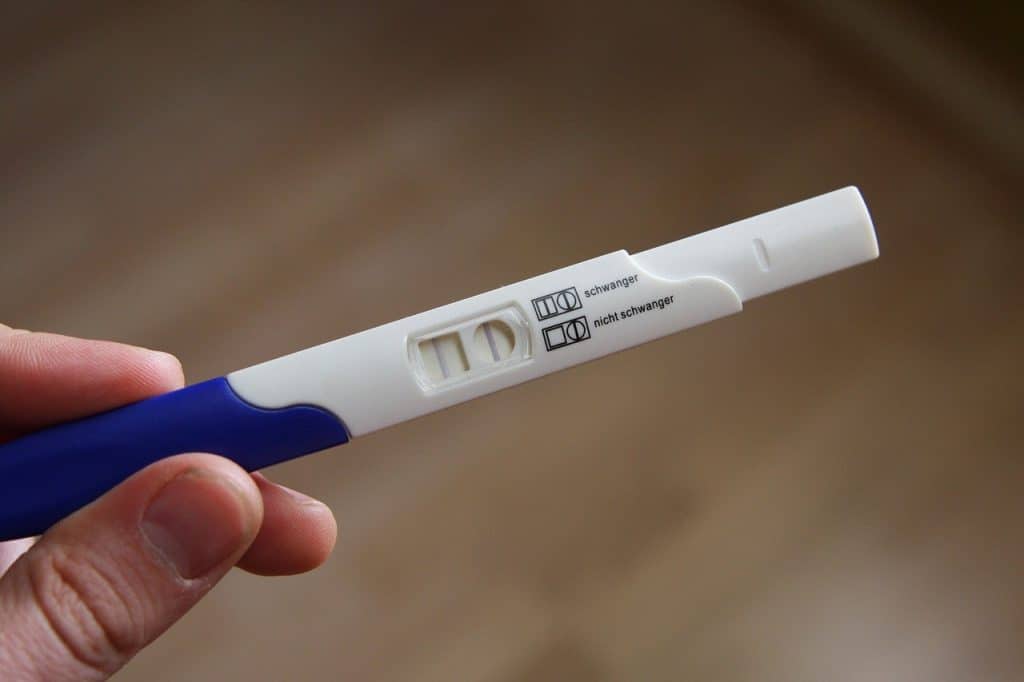
Aside from looking out for pregnancy symptoms, taking a pregnancy test is advisable for confirmation. You can use home pregnancy tests (HPTs) or ask your doctor to test you. It’s easy to acquire HPTs because they’re inexpensive, and most drugstores sell them.
The accuracy of HPTs depends on various factors. Firstly, it’s not advisable to use them right after missing a period. Use it one week after your missed period for a more accurate reading.
Secondly, you must follow the directions attached to the HPT. There are different kinds of HPTs. Some require urinating on the test stick, while others instruct you to collect urine in a cup where you should douse the test stick.
Lastly, it’s worth noting that certain medications affect HPTs. Therefore, it’s best to consult your doctor and ask them to conduct blood tests to detect human chorionic gonadotropin (hCG). A blood test detects pregnancy earlier than HPTs (usually six to eight days after ovulation).
Final Thoughts
The difference between a pregnant belly and a fat belly can be hard to spot – especially if the pregnancy is still only in the first trimester. Since these two conditions have to be handled differently, a false impression can be disastrous. This can get especially difficult to discern if you’re already a bit on the pudgy side!
While there are a lot of differences between a pregnant belly versus a fat belly, those signs can never be 100% reliable. If you suspect a pregnancy, get it checked the proper way: buy a pregnancy test or consult your doctor. In either case, you’ll want to pay closer attention to your personal health needs.
